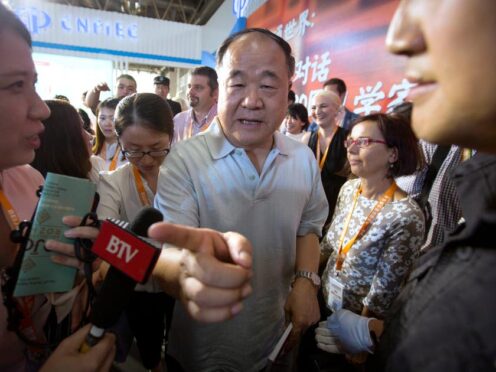Mo Yan, the winner of China’s first Nobel Prize for Literature, is being sued under a law that carries civil penalties for perceived slights against the country’s heroes and martyrs.
Patriotic campaigns have become more common in recent years in China, as online nationalists attack journalists, writers or other public figures they say have offended the country’s dignity, but it is unusual for a figure as prominent as Mo to be targeted.
Patriotic blogger Wu Wanzheng, who goes by the title “Truth-Telling Mao Xinghuo” online, sued Mo under a law that carries civil penalties and, in some cases, criminal punishments for perceived offences against Chinese heroes.
Wu claimed Mo’s books have smeared the Chinese Communist Party’s reputation, “beautified” enemy Japanese soldiers and insulted former revolutionary leader Mao Zedong.
The lawsuit filed last month demands that the author should apologise to all Chinese people, the country’s martyrs and Mao, and pay damages of 1.5 billion yuan (£163 million) — one yuan for each Chinese person. He also requested that Mo’s books should be removed from circulation.
Wu based his grievances on the 2018 law that made insulting heroes and martyrs a crime punishable by up to three years in prison.
The law is part of President Xi Jinping’s campaign to fight “historical nihilism”, a phrase the party uses for any interpretation of historical events that runs counter to its official narrative.
Mo, whose real name is Guan Moye, won the Nobel Prize in 2012. He is known for portraying rural life in China and delving into some of the downsides of the country’s rapid economic development.
“Literature and art should expose the darkness and injustice of society,” Mo said in 2005 while accepting an honorary doctorate from a Hong Kong university.
But the 69-year-old has had few conflicts with Beijing.
In 2011, he became vice chairman of the state-backed Chinese Writers Association. After he received his Nobel, a top party official praised him as an “outstanding representative” of China’s rising economic might and international influence.
It seems unlikely that Wu will win the lawsuit. The Chinese government has not formally commented on the saga, but state-run tabloid Global Times on Tuesday published a story quoting a recent speech by Mo, indirectly signalling support for the author.
The blogger said on Chinese social media platform Weibo that a Beijing court rejected his first lawsuit because Wu failed to provide Mo’s home address.
His current lawsuit is based on part of the 2018 law that would hold someone civilly liable if they insult or slander “heroes and martyrs to the detriment of the public interest”.
Sharp-tongued media commentator and former editor of Global Times Hu Xijin also criticided Wu, calling his attempt to sue Mo a “farce” and a “populist” act.
On Weibo, Hu decried support for the action as “a very alarming trend in online public opinion.”
In return, Wu also threatened to sue Hu.
Online, discussion was divided: Some called it a reflection of growing nationalism in China and others condemned the accusers. The controversy has trended on Weibo, where the hashtag #MoYanbeingsued had been viewed around two million times. At least one other related hashtag has been censored.
Murong Xuecun, a well-known Chinese writer who lives in exile in Australia, said he sees no evidence the government is backing the targeting of Mo, but it has created an environment where such patriotic attacks are encouraged.
“This trend has incited people to report, to inform on and to expose each other, targeting those who diverge from mainstream ideologies or promote universal values,” he said. “That’s what authorities have been doing.”
The 2018 law and other similar laws have resulted in scores of arrests, including an investigative reporter who challenged China’s official casualty numbers in a border skirmish with India in 2021 and a former editor of a financial magazine who questioned official justifications for China’s involvement in the Korean War.
